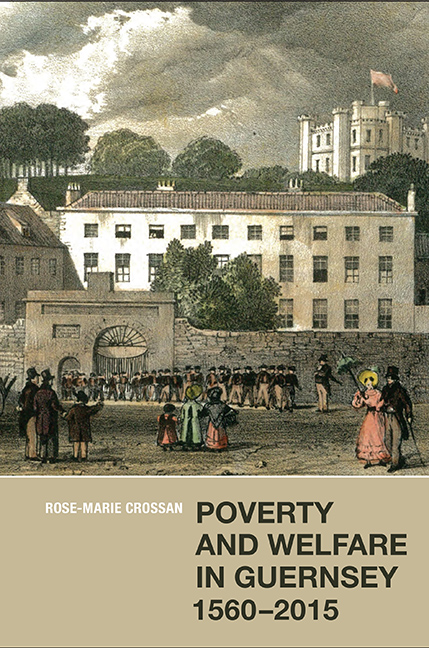Book contents
- Frontmatter
- Dedication
- Contents
- List of Illustrations
- Acknowledgements
- Abbreviations
- Conventions, Note on curren
- Maps
- Introduction
- I Context
- II Welfare
- III Town Hospital
- IV Twentieth Century and Beyond
- Conclusion
- Appendix 1 Writings on Peasant Proprietorship in Guernsey
- Appendix 2 Poor Rates, Indoor and Outdoor Relief Spending, St Peter Port, 1724–1924
- Appendix 3 Parochial Poor Relief in Other Channel Islands
- Appendix 4 Average Year-end Head-counts and Average Annual Admissions and Discharges, Town Hospital, 1700s–1900s
- Appendix 5 Adult Admissions Ascribed to Illness and Accidents, Town Hospital, 1852–1919
- Appendix 6 Relative Proportions of Men and Women in Year-end Head-counts and Annual Admissions, Town Hospital, 1750–1919
- Appendix 7 Annual Averages of Child Admissions and Year-end Numbers, Town Hospital, 1756–1919
- Appendix 8 Over-60s as a Proportion of all Inmates, and Composition by Sex of Over-60s Cohort, Town Hospital, 1756–1911
- Appendix 9 Average Weekly Amounts Purchased per Head, Town Hospital, 1760–1917
- Appendix 10 Timeline: Developments in Poor Relief and Social Security, 1700–2010
- Bibliography
- Index
Appendix 10 - Timeline: Developments in Poor Relief and Social Security, 1700–2010
Published online by Cambridge University Press: 18 June 2021
- Frontmatter
- Dedication
- Contents
- List of Illustrations
- Acknowledgements
- Abbreviations
- Conventions, Note on curren
- Maps
- Introduction
- I Context
- II Welfare
- III Town Hospital
- IV Twentieth Century and Beyond
- Conclusion
- Appendix 1 Writings on Peasant Proprietorship in Guernsey
- Appendix 2 Poor Rates, Indoor and Outdoor Relief Spending, St Peter Port, 1724–1924
- Appendix 3 Parochial Poor Relief in Other Channel Islands
- Appendix 4 Average Year-end Head-counts and Average Annual Admissions and Discharges, Town Hospital, 1700s–1900s
- Appendix 5 Adult Admissions Ascribed to Illness and Accidents, Town Hospital, 1852–1919
- Appendix 6 Relative Proportions of Men and Women in Year-end Head-counts and Annual Admissions, Town Hospital, 1750–1919
- Appendix 7 Annual Averages of Child Admissions and Year-end Numbers, Town Hospital, 1756–1919
- Appendix 8 Over-60s as a Proportion of all Inmates, and Composition by Sex of Over-60s Cohort, Town Hospital, 1756–1911
- Appendix 9 Average Weekly Amounts Purchased per Head, Town Hospital, 1760–1917
- Appendix 10 Timeline: Developments in Poor Relief and Social Security, 1700–2010
- Bibliography
- Index
Summary
1724 St Peter Port levies its first poor rate
1726 Ord, 18.4.1726 establishes concept of settlement
1730 St Peter Port introduces uniforms for parochial paupers
1738 St Peter Port Chefs de Famille decide to build a workhouse
1743 St Peter Port's workhouse (the Town Hospital) is opened to paupers
1744 St Saviours levies a poor rate (? first in country parishes)
1752 Foundation deed of Country Hospital signed
1764 First paupers admitted to Country Hospital; most country parishes begin to levy poor rates
1788 States undertake to refund parochial relief expenses in respect of soldiers’ dependants (Acte, 19.4.1788)
1832 Town Hospital opens its house of separation
1851 Town Hospital closes its house of separation and opens a lunatic asylum
1852 O in C, 28.12.1852 establishes St Peter Port Poor Law Board
1867 O in C, 26.6.1867 confers settlement on non-natives after 20 years’ unbroken residence
1876 O in C, 27.6.1876 establishes Poor Law Boards in country parishes
1889 Ord, 30.9.1889 introduces certification for patients admitted to lunatic asylums
1892 States undertake to refund parochial relief expenses in respect of all strangers (Ord, 25.4.1892)
1899 States’ Board of Health is established; first States’ Medical Officer of Health is appointed
1900 Law on Compensation to Families of Persons killed in Accidents (O in C, 13.12.1900)
1901 Ord, 21.12.1901 brings Town and Country Hospitals under Royal Court supervision
1903 King Edward VII isolation hospital opens
1910 O in C, 11.6.1910 introduces new provisions for certification of patients admitted to lunatic asylums
1917 Law on the Protection of Children and Young People (O in C, 24.1.1917)
1919 States’ Income Tax Law (O in C, 20.12.1919)
1920 O in C, 13.10.1920 extends franchise for States elections to non-ratepaying men over 20 and non-ratepaying women over 30
1924 Workmen's Accident Compensation Law (O in C, 9.10.1924)
1925 O in C, 24.7.1925 transfers responsibility for poor relief funding from parishes to States, and creates States’ Central Poor Law Board
1926 Non-Contributory Old Age Pensions Law (O in C, 19.3.1926); O in C, 30.4.1926 makes poor relief a secular matter in all parishes; ord, 1.5.1926 transfers ownership of Town and Country Hospitals to States
1928 O in C, 24.11.1928 creates Children Board as a sub-committee of States’ Central Poor Law Board, and establishes States’ Children's Home
1931 O in C, 1.10.1931 modifies Non-Contributory Old Age Pensions Law to make pensions available to blind persons over 50
- Type
- Chapter
- Information
- Poverty and Welfare in Guernsey, 1560-2015 , pp. 296 - 298Publisher: Boydell & BrewerPrint publication year: 2015



